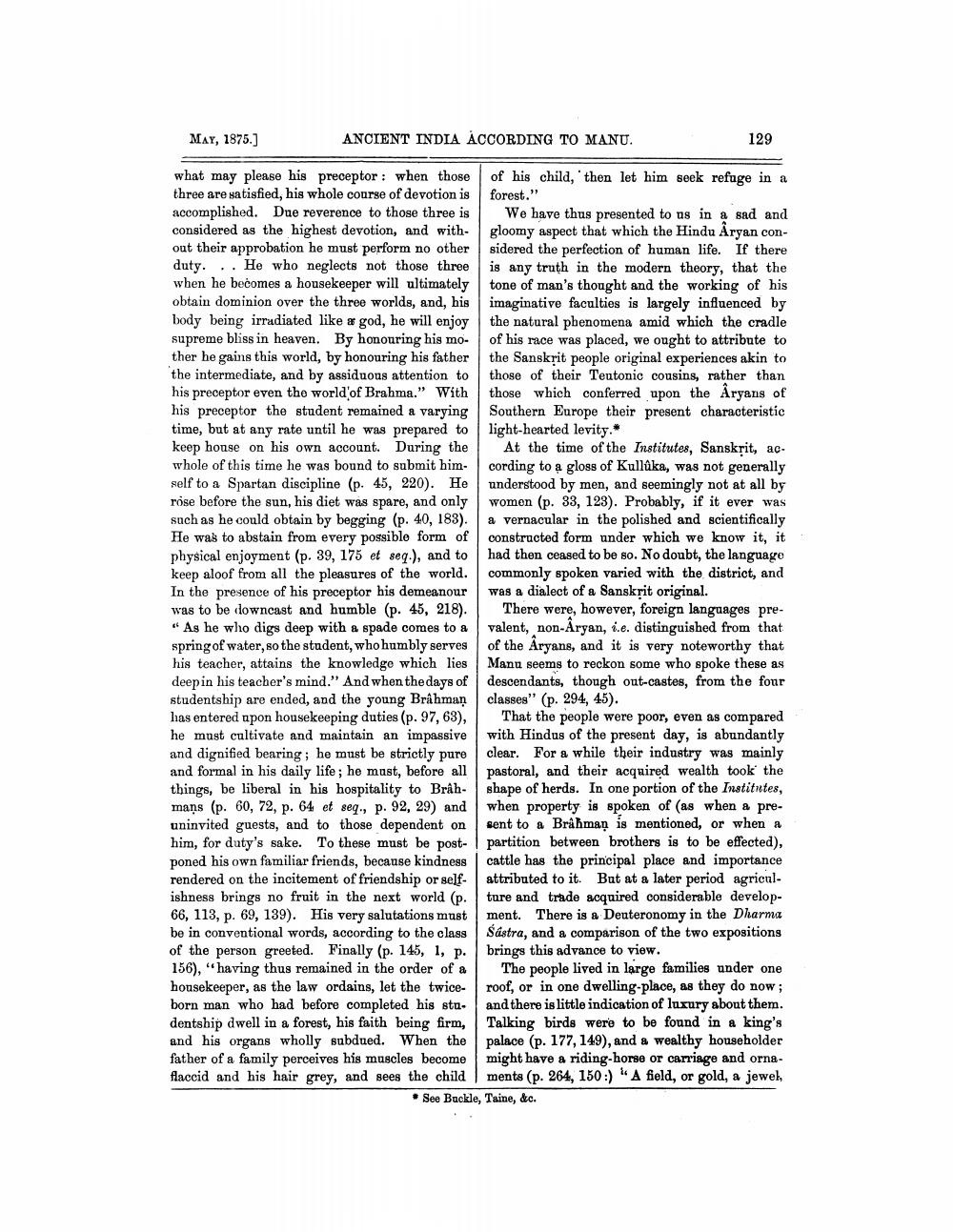________________
ANCIENT INDIA ACCORDING TO MANU.
MAY, 1875.]
what may please his preceptor: when those three are satisfied, his whole course of devotion is accomplished. Due reverence to those three is considered as the highest devotion, and without their approbation he must perform no other duty... He who neglects not those three when he becomes a housekeeper will ultimately obtain dominion over the three worlds, and, his body being irradiated like a god, he will enjoy supreme bliss in heaven. By honouring his mother he gains this world, by honouring his father the intermediate, and by assiduous attention to his preceptor even the world of Brahma." With his preceptor the student remained a varying time, but at any rate until he was prepared to keep house on his own account. During the whole of this time he was bound to submit himself to a Spartan discipline (p. 45, 220). He rose before the sun, his diet was spare, and only such as he could obtain by begging (p. 40, 183). He was to abstain from every possible form of physical enjoyment (p. 39, 175 et seq.), and to keep aloof from all the pleasures of the world. In the presence of his preceptor his demeanour was to be downcast and humble (p. 45, 218). "As he who digs deep with a spade comes to a spring of water, so the student, who humbly serves his teacher, attains the knowledge which lies deep in his teacher's mind." And when the days of studentship are ended, and the young Brâhman has entered upon housekeeping duties (p. 97, 63), he must cultivate and maintain an impassive and dignified bearing; he must be strictly pure and formal in his daily life; he must, before all things, be liberal in his hospitality to Brâhmans (p. 60, 72, p. 64 et seq., p. 92, 29) and uninvited guests, and to those dependent on him, for duty's sake. To these must be postponed his own familiar friends, because kindness rendered on the incitement of friendship or selfishness brings no fruit in the next world (p. 66, 113, p. 69, 139). His very salutations must be in conventional words, according to the class of the person greeted. Finally (p. 145, 1, p. 156), "having thus remained in the order of a housekeeper, as the law ordains, let the twiceborn man who had before completed his studentship dwell in a forest, his faith being firm, and his organs wholly subdued. When the father of a family perceives his muscles become flaccid and his hair grey, and sees the child
129
of his child, then let him seek refuge in a forest."
We have thus presented to us in a sad and gloomy aspect that which the Hindu Aryan considered the perfection of human life. If there is any truth in the modern theory, that the tone of man's thought and the working of his imaginative faculties is largely influenced by the natural phenomena amid which the cradle of his race was placed, we ought to attribute to the Sanskrit people original experiences akin to those of their Teutonic cousins, rather than
those which conferred upon the Aryans of Southern Europe their present characteristic light-hearted levity.*
At the time of the Institutes, Sanskrit, according to a gloss of Kullûka, was not generally understood by men, and seemingly not at all by women (p. 33, 123). Probably, if it ever was a vernacular in the polished and scientifically constructed form under which we know it, it had then ceased to be so. No doubt, the language commonly spoken varied with the district, and was a dialect of a Sanskrit original.
There were, however, foreign languages prevalent, non-Aryan, i.e. distinguished from that of the Aryans, and it is very noteworthy that Manu seems to reckon some who spoke these as descendants, though out-castes, from the four classes" (p. 294, 45).
That the people were poor, even as compared with Hindus of the present day, is abundantly clear. For a while their industry was mainly pastoral, and their acquired wealth took the shape of herds. In one portion of the Institutes, when property is spoken of (as when a present to a Brahman is mentioned, or when a partition between brothers is to be effected), cattle has the principal place and importance attributed to it. But at a later period agriculture and trade acquired considerable development. There is a Deuteronomy in the Dharma Sastra, and a comparison of the two expositions brings this advance to view.
The people lived in large families under one roof, or in one dwelling-place, as they do now; and there is little indication of luxury about them. Talking birds were to be found in a king's palace (p. 177, 149), and a wealthy householder might have a riding-horse or carriage and ornaments (p. 264, 150:) "A field, or gold, a jewel, * See Buckle, Taine, &c.




